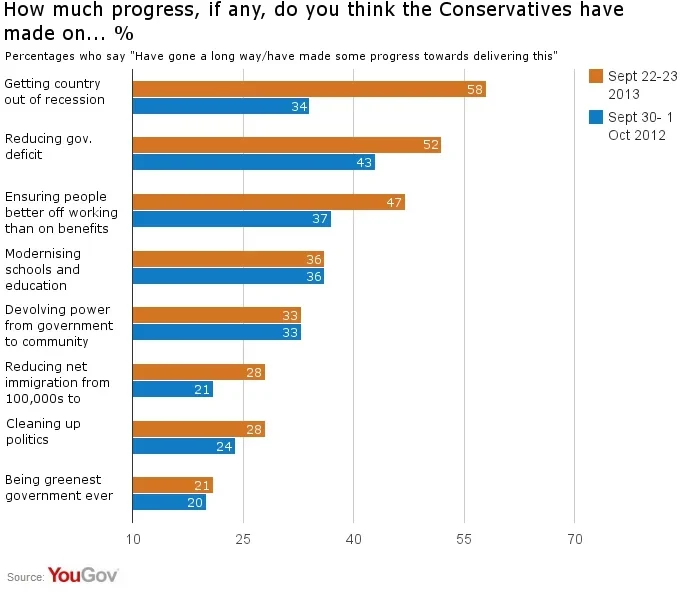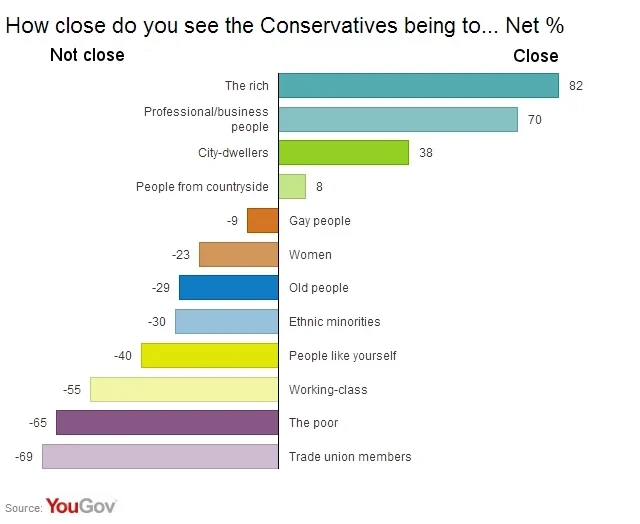Many more voters think the Conservatives are making progress on growth and the deficit than thought so last year – but they have yet to engage with a wider array of voters
As Conservative activists from around the country descend on Manchester for the party’s 2013 conference, new YouGov research for the Sun reveals where feelings towards the party, its leader and their policies have improved – and where they have failed to shift. The results suggest that focusing on the economy has paid off for the Conservatives, but now the party must make progress on the other areas of their 2010 manifesto and connect with a more diverse range of voters.
Green shoots
Recent months have been something of a success story for the Conservatives and David Cameron. As recently as May this year, the Conservatives lagged beind the Labour party by an average of 10 points, just as they did in September 2012. In comparison, the average Labour lead for September 2013 is half that, just 5 points, even including the recent spike of Labour support following their own conference that put them 11 points ahead in today's poll.
Similarly, David Cameron’s ratings have edged up: after showing signs of improvement in early 2013, his approval rating (doing well minus doing badly) slumped to -26% in May, matching the -25% he received in September 2012. At -15%, the Prime Minister's approval rating is 10 points higher than that this month.
Progress report
As YouGov’s economic tracking data shows, voters see the economy as being roughly at its best since 2010. Likewise, 24% more British adults than last September say the Conservatives have made progress towards getting the economy out of recession. And 9% more than last year say the same about their reduction of the deficit.
Another boost is on welfare: 10% more than September 2012 say the Conservatives have made progress on ensuring people are better off working than on benefits.

With other campaign goals, however, they have made less headway. On modernising schools and education, the same amount (36%) as last year say the Conservatives have made progress. On the key issue of reducing net migration, 7% more of the public think the coalition leaders have made progress compared to last year, although a majority of the public (53%) still say the Conservatives have made little or no progress. In a blow to the government, ONS figures in late August revealed that net migration to the UK had actually increased during 2012.
Whose party?
YouGov tracking data for the Sun consistently finds that around 50% of voters say the statement ‘it seems to appeal to one section of society rather than the whole country’ applies most to the Conservatives, whereas around 20% say the same of Labour. The Sun/YouGov’s latest study delves deeper, revealing exactly who voters think the Conservatives are close – and not close – to.
After subtracting the number who say 'not close' form 'close' the Conservatives get a score of 82% when it comes to 'the rich', the group voters appear to believe Tories are closest to. Next is professional and business people, with 72%, then city-dwellers with 38% and finally people from the countryside with 8%.

The Conservatives appear to be struggling to connect with the other groups mentioned.
Despite all of he political capital Cameron expended on the issue of gay marriage, more Britons still think his party is not close to gay people than think it is. Meanwhile the Conservatives have a score of -23% for women and -30% for ethnic minorities. Mirroring how close voters feel the party is to the rich, 'the poor' are rated as one of the groups the Conservatives are furthest from, with a score of -65%.
Labour’s conference – where Ed Miliband announced a series of populist pledges, including a 20-month freeze of energy prices – was seen by many commentators as a success. The Conservative conference may now provide the party an opportunity to prove they can meet Labour’s focus on improving living standards and connect with those sections of society seen as underrepresented by the party.
Image: Getty
See the full tracker results (voting intention)
See the full tracker results (party leaders)






